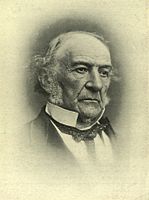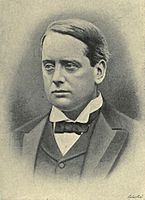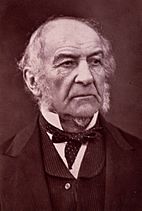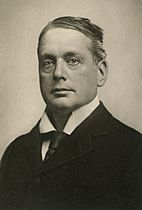Liberal government, 1892–1895 facts for kids
In the 1892 general election, the Conservative Party, led by Lord Salisbury, won the most seats. However, they did not win enough seats to have an overall majority (more than half the seats). Because of this, William Gladstone's Liberal Party was able to form a government. This was a minority government, meaning it needed support from other parties to pass laws. They relied on help from Irish Nationalist politicians.
On March 3, 1894, Gladstone resigned. This happened because his plan for "Home Rule" for Ireland was rejected. This plan would have given Ireland more control over its own affairs. After Gladstone left, the Earl of Rosebery became the new Prime Minister.
Contents
Understanding Government Cabinets
A government's "Cabinet" is like a team of important ministers. These ministers are chosen by the Prime Minister. Each minister is in charge of a specific area, like foreign affairs or money. They work together to make big decisions for the country.
Gladstone's Last Government (1892–1894)
Quick facts for kids Fourth Gladstone ministry |
|
|---|---|
| 1892–1894 | |

Gladstone
|
|
| Date formed | 15 August 1892 |
| Date dissolved | 2 March 1894 |
| People and organisations | |
| Monarch | Victoria |
| Prime Minister | William Gladstone |
| Member party | Liberal Party |
| Status in legislature |
Minority
dependent on IPP support |
| Opposition party | Conservative Party |
| Opposition leaders |
|
| History | |
| Election(s) | 1892 general election |
| Legislature term(s) | 25th UK Parliament |
| Predecessor | Second Salisbury ministry |
| Successor | Rosebery ministry |
This was William Gladstone's fourth and final time as Prime Minister. He was 82 years old when he took office. His government was formed in August 1892.
Here are some of the key people in his Cabinet:
- William Gladstone was the Prime Minister. He was also in charge of the Treasury and was the leader in the House of Commons.
- Lord Herschell was the Lord Chancellor. This is a very senior legal role.
- The Earl of Kimberley was the Lord President of the Council and also the Secretary for India. He led the House of Lords.
- H. H. Asquith was the Home Secretary. This person is in charge of law and order within the country.
- The Earl of Rosebery was the Foreign Secretary. He handled relationships with other countries.
- The Marquess of Ripon was the Colonial Secretary. He looked after the British Empire's colonies.
- Sir Henry Campbell-Bannerman was the Secretary for War. He was responsible for the army.
- Sir William Harcourt was the Chancellor of the Exchequer. He managed the country's money.
- The Earl Spencer was the First Lord of the Admiralty. He was in charge of the navy.
Gladstone resigned in March 1894. This was mainly because his plan for Irish Home Rule was not supported.
Rosebery's Government (1894–1895)
| Rosebery ministry | |
|---|---|
| 1894–1895 | |

Rosebery (c. 1895)
|
|
| Date formed | 5 March 1894 |
| Date dissolved | 22 June 1895 |
| People and organisations | |
| Monarch | Victoria |
| Prime Minister | Lord Rosebery |
| Member party | Liberal Party |
| Status in legislature |
Minority
dependent on IPP support |
| Opposition party | Conservative Party |
| Opposition leaders |
|
| History | |
| Legislature term(s) |
25th UK Parliament
lost a vote of confidence |
| Predecessor | Fourth Gladstone ministry |
| Successor | Third Salisbury ministry |
After Gladstone, Lord Rosebery became Prime Minister in March 1894. His government was also a minority government. This meant it faced similar challenges to Gladstone's.
Many of the ministers from Gladstone's Cabinet stayed in their roles under Rosebery.
- The Earl of Rosebery became Prime Minister. He also took on the roles of First Lord of the Treasury, Lord President of the Council, and leader in the House of Lords.
- Lord Herschell remained Lord Chancellor.
- Lord Tweedmouth became Lord Privy Seal.
- H. H. Asquith stayed as Home Secretary.
- The Earl of Kimberley moved from India Secretary to Foreign Secretary.
- The Marquess of Ripon continued as Colonial Secretary.
- Sir Henry Campbell-Bannerman remained Secretary for War.
- Henry Fowler became Secretary for India.
- Sir William Harcourt stayed as Chancellor of the Exchequer and became leader in the House of Commons.
- The Earl Spencer remained First Lord of the Admiralty.
- James Bryce took over as President of the Board of Trade in May 1894.
Rosebery's government lasted until June 1895. It lost a vote of confidence in the House of Commons. This led to a general election, which the Liberal Party lost.
 | Mary Eliza Mahoney |
 | Susie King Taylor |
 | Ida Gray |
 | Eliza Ann Grier |



